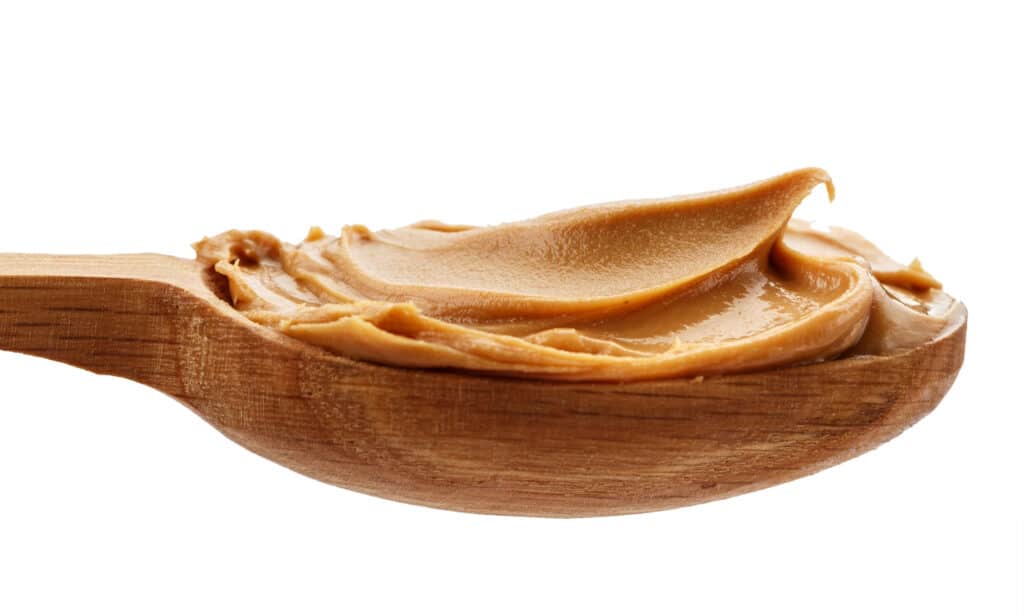*This page may include affiliate links, which means that if you make a purchase through one of the product links, we may receive a small commission. For full affiliate disclosure please see our disclaimer page.
As a loving dog owner, you want the very best for your furry friend, and that includes making sure they maintain optimal digestive health. While some human foods can provide health benefits for dogs, it’s essential to separate fact from fiction and ensure that you’re not inadvertently causing harm to your beloved pet. One such human food, peanut butter, has gained popularity as a treat for dogs, leaving many pet owners wondering if it can also help alleviate constipation in their canine companions. The short answer is no, peanut butter is not effective against dog constipation. In this blog, we’ll dive deep into the topic of peanut butter and dog constipation, exploring expert opinions and uncovering the truth behind this popular pantry staple. Join us as we unravel the mystery and provide you with the insights you need to make the best decisions for your dog’s digestive well-being.

Understanding Dog Constipation
As a dog owner, being aware of your pet’s digestive health is crucial. Constipation is a common issue that can affect dogs of any age, breed, or size. To help your furry friend, it’s essential to recognize the signs of constipation and understand the potential causes.
Definition and Symptoms of Constipation in Dogs
Constipation is defined as the infrequent or difficult passage of feces.
Signs of Constipation in Dogs Include:
- Straining to defecate
- Producing small, hard, or dry stools
- Infrequent bowel movements
- Whimpering or showing signs of discomfort while trying to defecate
- Scooting or dragging their rear on the ground
Common Causes of Constipation in Dogs:
- Inadequate water intake
- Lack of dietary fiber
- Sedentary lifestyle or lack of exercise
- Swallowing foreign objects or hair from excessive grooming
- Medical issues such as anal gland problems, enlarged prostate, or neurological disorders
- Medications or supplements that may cause constipation as a side effect
When to Consult a Veterinarian:
- Constipation that persists for more than 48 hours
- Your dog shows signs of severe discomfort, lethargy, or loss of appetite
- If you notice blood or mucus in the stools or around the anus
- Your dog has a history of medical issues or is on medications that may contribute to constipation
Understanding the symptoms and causes of constipation in your dog is crucial for maintaining their overall health. If you’re ever in doubt, it’s always best to consult your

Peanut Butter: Nutritional Overview
Peanut butter is a popular and delicious treat that has become a staple in many households. As a dog owner, it’s essential to understand the nutritional content of peanut butter and how it may impact your pet’s health, both positively and negatively. Peanut butter is high in healthy fats, such as monounsaturated and polyunsaturated fats, and rich in protein. It also contains essential vitamins and minerals like vitamin E, B vitamins, magnesium, and zinc, along with a moderate amount of dietary fiber. However, the sugar and salt content can vary by brand and type.
The health benefits of peanut butter for humans and dogs include providing a good source of energy due to its high-fat content, supporting muscle growth and repair with its protein content, and contributing to overall health and well-being through its vitamins and minerals. Additionally, peanut butter can help keep your dog’s coat shiny and healthy due to its healthy fat content and may act as a delicious treat for positive reinforcement during training.
Despite these benefits, there are potential risks and considerations for dogs when it comes to peanut butter. Its high-calorie content means that overfeeding peanut butter can contribute to weight gain and obesity in dogs. Some dogs may be allergic to peanuts, leading to adverse reactions. It’s crucial to ensure that the peanut butter you choose is free from xylitol, a sugar substitute that is highly toxic to dogs. Additionally, be cautious when giving peanut butter to dogs, as it can be sticky and difficult to swallow for some pets, posing a choking hazard. As a pet owner, being aware of the nutritional content of peanut butter and using moderation when offering it to your furry friend is vital to ensure their health and safety.

Expert Opinions on Peanut Butter for Dog Constipation
When it comes to addressing dog constipation, many pet owners wonder if peanut butter can serve as an effective remedy. To get a clear understanding, it’s essential to explore expert opinions on this matter. Interestingly, peanut butter is not a widely recommended treatment for dog constipation by veterinarians. While peanut butter contains some fiber, the amount is typically not enough to effectively alleviate constipation in dogs. Furthermore, the high-fat content in peanut butter can sometimes exacerbate digestive issues, making it an unsuitable choice for treating constipation.
Instead of relying on peanut butter, experts suggest alternative remedies and treatments for dog constipation, such as increasing water intake, adding high-fiber foods like canned pumpkin or wheat bran to your dog’s meals, and encouraging regular exercise to stimulate bowel movements and promote healthy digestion. In some cases, veterinarians may recommend over-the-counter stool softeners or laxatives, like lactulose or Miralax, while severe cases might require veterinary intervention, such as medication or enemas.
If you still choose to give peanut butter to your dog, it’s essential to take precautions. Make sure to select a peanut butter that is free of xylitol, as this sweetener is toxic to dogs. Provide peanut butter in moderation, as excessive consumption can lead to weight gain and other health issues. And finally, monitor your dog for any signs of allergic reactions or intolerance when introducing peanut butter to their diet. In conclusion, expert opinions suggest that peanut butter is not an ideal remedy for dog constipation, and pet owners should consider alternative solutions and consult with a veterinarian when necessary.

Proper Diet and Exercise to Prevent Constipation in Dogs
Maintaining your dog’s digestive health is a crucial aspect of ensuring their overall wellbeing. A balanced diet and regular exercise play vital roles in preventing constipation and keeping your furry friend in tip-top shape. Let’s explore the importance of proper nutrition and physical activity for your dog’s digestive health.
Importance of Balanced Nutrition for Canine Digestive Health:
- A well-balanced diet provides essential nutrients, vitamins, and minerals needed for optimal digestion and overall health.
- The right balance of dietary fiber helps maintain regular bowel movements and prevents constipation.
- High-quality protein sources aid in muscle growth and repair, which is essential for a healthy gastrointestinal tract.
Tips for Choosing the Right Dog Food:
- Consult your veterinarian for recommendations based on your dog’s age, breed, size, and activity level.
- Look for high-quality, easily digestible protein sources, such as chicken, turkey, or fish.
- Opt for dog foods with natural sources of fiber, like sweet potatoes, peas, or brown rice.
- Avoid dog foods with artificial additives, fillers, or excessive amounts of low-quality grains.
- Consider your dog’s unique dietary needs, such as allergies or sensitivities, when selecting a suitable dog food.
The Role of Exercise in Maintaining Healthy Digestion:
- Regular physical activity stimulates bowel movements and promotes overall digestive health.
- Exercise helps maintain a healthy weight, reducing the risk of obesity-related digestive issues.
- Engaging in routine exercise with your dog strengthens the bond between you and your pet, promoting a sense of well-being and reducing stress, which can negatively impact digestion.
By focusing on providing your dog with a balanced diet and regular exercise, you can prevent constipation and support their digestive health. Always consult your veterinarian for personalized recommendations based on your dog’s individual needs, and remember that a happy, healthy dog is one that is well-nourished and active.

High-Fiber Pumpkin and Oat Dog Treats Recipe
Treat your furry friend to a delicious and healthy homemade snack that is not only easy to make but also packed with fiber to promote healthy digestion. These pumpkin and oat dog treats are a great way to incorporate more fiber into your dog’s diet while providing them with a tasty reward.
Ingredients:
- 1 1/2 cups rolled oats
- 1 cup whole wheat flour (or substitute with a gluten-free flour if your dog has a sensitivity)
- 1/2 cup canned pumpkin (make sure it’s pure pumpkin, not pumpkin pie filling)
- 1/4 cup natural, unsweetened applesauce
- 1/4 cup water
- 1 large egg
- 1 tablespoon ground flaxseed
Instructions:
- Preheat your oven to 350°F (175°C) and line a baking sheet with parchment paper.
- In a large mixing bowl, combine the rolled oats and whole wheat flour (or gluten-free flour).
- In a separate bowl, mix together the canned pumpkin, applesauce, water, and egg until well combined.
- Gradually pour the wet pumpkin mixture into the dry oat and flour mixture, stirring until a dough forms. Add the ground flaxseed and mix until evenly distributed throughout the dough.
- On a lightly floured surface, roll out the dough to approximately 1/4-inch thickness. Use your favorite dog-themed cookie cutter to cut out treat shapes.
- Place the cut-out treats onto the prepared baking sheet, leaving a small gap between each treat.
- Bake the treats in the preheated oven for 25-30 minutes, or until they are firm and slightly golden around the edges.
- Remove the treats from the oven and let them cool completely on a wire rack.
- Once cooled, store the high-fiber pumpkin and oat dog treats in an airtight container for up to two weeks.

Conclusion
Taking care of your dog’s digestive health is crucial for their overall happiness and wellbeing. This involves providing a balanced diet, ensuring regular exercise, and occasionally treating them with high-fiber snacks. While peanut butter might be a popular treat for dogs, it’s important to remember that it isn’t the best solution for dog constipation. Instead, concentrate on offering your dog a well-rounded diet that includes fiber-rich foods and engage in consistent physical activities together to prevent constipation and support their digestive health. Keep in mind that each dog has unique needs, so always consult your veterinarian for personalized advice based on your pet’s specific requirements. By being proactive and attentive to your dog’s digestive health, you can help them lead a happy, healthy, and active life alongside you.
~Sheena
